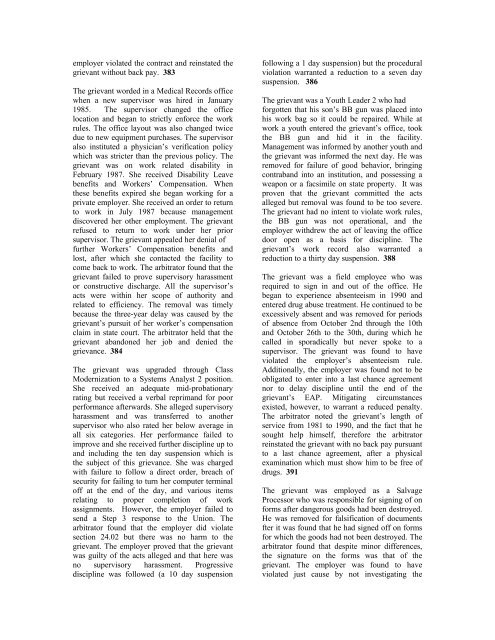by Contract Number (PDF) - OCSEA
by Contract Number (PDF) - OCSEA
by Contract Number (PDF) - OCSEA
Create successful ePaper yourself
Turn your PDF publications into a flip-book with our unique Google optimized e-Paper software.
employer violated the contract and reinstated the<br />
grievant without back pay. 383<br />
The grievant worded in a Medical Records office<br />
when a new supervisor was hired in January<br />
1985. The supervisor changed the office<br />
location and began to strictly enforce the work<br />
rules. The office layout was also changed twice<br />
due to new equipment purchases. The supervisor<br />
also instituted a physician’s verification policy<br />
which was stricter than the previous policy. The<br />
grievant was on work related disability in<br />
February 1987. She received Disability Leave<br />
benefits and Workers’ Compensation. When<br />
these benefits expired she began working for a<br />
private employer. She received an order to return<br />
to work in July 1987 because management<br />
discovered her other employment. The grievant<br />
refused to return to work under her prior<br />
supervisor. The grievant appealed her denial of<br />
further Workers’ Compensation benefits and<br />
lost, after which she contacted the facility to<br />
come back to work. The arbitrator found that the<br />
grievant failed to prove supervisory harassment<br />
or constructive discharge. All the supervisor’s<br />
acts were within her scope of authority and<br />
related to efficiency. The removal was timely<br />
because the three-year delay was caused <strong>by</strong> the<br />
grievant’s pursuit of her worker’s compensation<br />
claim in state court. The arbitrator held that the<br />
grievant abandoned her job and denied the<br />
grievance. 384<br />
The grievant was upgraded through Class<br />
Modernization to a Systems Analyst 2 position.<br />
She received an adequate mid-probationary<br />
rating but received a verbal reprimand for poor<br />
performance afterwards. She alleged supervisory<br />
harassment and was transferred to another<br />
supervisor who also rated her below average in<br />
all six categories. Her performance failed to<br />
improve and she received further discipline up to<br />
and including the ten day suspension which is<br />
the subject of this grievance. She was charged<br />
with failure to follow a direct order, breach of<br />
security for failing to turn her computer terminal<br />
off at the end of the day, and various items<br />
relating to proper completion of work<br />
assignments. However, the employer failed to<br />
send a Step 3 response to the Union. The<br />
arbitrator found that the employer did violate<br />
section 24.02 but there was no harm to the<br />
grievant. The employer proved that the grievant<br />
was guilty of the acts alleged and that here was<br />
no supervisory harassment. Progressive<br />
discipline was followed (a 10 day suspension<br />
following a 1 day suspension) but the procedural<br />
violation warranted a reduction to a seven day<br />
suspension. 386<br />
The grievant was a Youth Leader 2 who had<br />
forgotten that his son’s BB gun was placed into<br />
his work bag so it could be repaired. While at<br />
work a youth entered the grievant’s office, took<br />
the BB gun and hid it in the facility.<br />
Management was informed <strong>by</strong> another youth and<br />
the grievant was informed the next day. He was<br />
removed for failure of good behavior, bringing<br />
contraband into an institution, and possessing a<br />
weapon or a facsimile on state property. It was<br />
proven that the grievant committed the acts<br />
alleged but removal was found to be too severe.<br />
The grievant had no intent to violate work rules,<br />
the BB gun was not operational, and the<br />
employer withdrew the act of leaving the office<br />
door open as a basis for discipline. The<br />
grievant’s work record also warranted a<br />
reduction to a thirty day suspension. 388<br />
The grievant was a field employee who was<br />
required to sign in and out of the office. He<br />
began to experience absenteeism in 1990 and<br />
entered drug abuse treatment. He continued to be<br />
excessively absent and was removed for periods<br />
of absence from October 2nd through the 10th<br />
and October 26th to the 30th, during which he<br />
called in sporadically but never spoke to a<br />
supervisor. The grievant was found to have<br />
violated the employer’s absenteeism rule.<br />
Additionally, the employer was found not to be<br />
obligated to enter into a last chance agreement<br />
nor to delay discipline until the end of the<br />
grievant’s EAP. Mitigating circumstances<br />
existed, however, to warrant a reduced penalty.<br />
The arbitrator noted the grievant’s length of<br />
service from 1981 to 1990, and the fact that he<br />
sought help himself, therefore the arbitrator<br />
reinstated the grievant with no back pay pursuant<br />
to a last chance agreement, after a physical<br />
examination which must show him to be free of<br />
drugs. 391<br />
The grievant was employed as a Salvage<br />
Processor who was responsible for signing of on<br />
forms after dangerous goods had been destroyed.<br />
He was removed for falsification of documents<br />
fter it was found that he had signed off on forms<br />
for which the goods had not been destroyed. The<br />
arbitrator found that despite minor differences,<br />
the signature on the forms was that of the<br />
grievant. The employer was found to have<br />
violated just cause <strong>by</strong> not investigating the
















